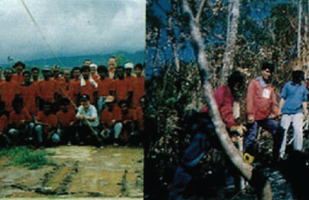
Task Force Ilahas
Negros Occidental
1998
Negros Occidental had daunting environmental problems. Commercial logging up to the 1970's followed by rampant illegal logging reduced the province's forest cover from 38% of the total land area to only 4.7%. Because of armed illegal loggers and NPA units in the forests, the DENR found it difficult to enforce the forestry laws. Administratively, the forests in the mountains were divided like slices of a pie among numerous municipalities making an integrated environmental program next to impossible. In 1995, heavy floods in Northern Negros killed 13 people and destroyed millions of pesos worth of agricullural crops. Ironically, during the dry season, farms said to have been irrigated all year round in the past could no longer have a second cropping because of lack of irrigation water.
The Provincial Environment Management Office (PEMO) created in 1992 was strengthened when Gov. Coscollucla declared the Environment War in 1993 (later called Balik llahas meaning Bring Back the Wild Animals), an integrated environmental management program. The North Negros Forestry Reserve Management Council and the South Negros Coastal Management Council were created to coordinate the various efforts. Executive Order No. 95-11 was issued by the governor creating the Task Force llahas to focus on the enforcement of the environmental laws. There were 20 regular composite members of the task force composed of personnel from various governments, the Department of Environment and Natural Resource, PNP Provincial Command, PNP Regional Mobile Forces and volunteers from the private sector. Due to the overwhelming support from the populace, Task Force llahas has around 185 assets composed of 135 Bantay Bukid (Forest Watch members) and 30 indigenous tribe members called Tribu Ati. All of them were stationed in hot spots to provide information on persons engaged in illegal and destructive forest activities. Thousands of community-based volunteers were also mobilized for the various environmental activities.
Under Balik llahas, 1.3 million board feet of illegally-sourced logs worth P9.5 million were seized, 64 criminal cases were filed for violation of the Revised Forestry Code with seven convictions, an estimated annual damage of P47 million due to timber poaching was curtailed and 16,420 hectares in the upland areas had been reforested. Over a million tree seedlings were planted with a 76% survival rate. As a result, provincial forest cover had increased to 7%; most of the illegal logging activities had stopped; and faith in the government's ability to protect the environment had been restored.
This program is recognized as one of the Ten Outstanding Programs in the 1998 Galing Pook Awards.


